from Rotarian
Save Your Neck
by Ellis Parker Butler
"If you want me to tell the truth about it," said the Laundry Member, "I wasn't thinking of it that way at all -- of the rough edges some of these laundries leave on your collars. When I had that line -- 'Patronize the Gem Laundry and Save Your Neck' -- printed on all my wrapping paper, with that picture of a collar, I was thinking about civilization. I was thinking of giving the people of this town a hint that it might be a good thing to put on a clean collar every morning,
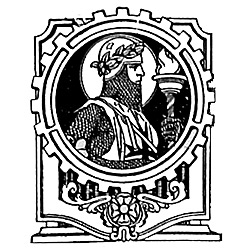 and not say, 'Pshaw, what does it matter? This collar is almost clean, I can wear it another day.' Because, as I thought the thing out, it does matter.
and not say, 'Pshaw, what does it matter? This collar is almost clean, I can wear it another day.' Because, as I thought the thing out, it does matter.
"I don't pretend to be much of a thinker; it don't come in my line of business, and it don't come in many men's lines of business. And there's not much thinking anywhere -- not real thinking. They've got a new word for what most of us do when we think we are thinking -- they call it 'rationalizing.' That means digging up a reason for something you've already decided.
"Take Rotary, for instance. A few good fellows who are in business, and have to plug at it pretty hard, happen to be the sort who like to get together at lunch and have a little fun and merriment and keep acquainted with each other. They have a desire to do that. Maybe there was a time once when, if a few fellows wanted to get together at lunch and enjoy each other, they went and did it and thought nothing of it, but I doubt that. Anyway, it can't be done now. A man feels he must have a reason for everything. So he sits down and 'thinks' about what he wants to do. What he wants to do, you understand. He says to himself, 'My business would be better in every way if I got out of a rut. I would be cheerier and snappier if I got together with the live men of this town once a week.' And so on. He rationalizes his wish, and that means he feels he wants something and then sits down and thinks of some reason why it is the best thing to do.
"A man can do that about the color of the socks he wears. If a man has a wife, and she buys him a pair of green socks, and he never did like the color of green for socks, he can sit down and think up a perfectly good reason for not wearing green socks. He can say, 'Green used to be a poison color. It may not be now, but you can't be too sure.'
"Nearly all the thinking we think we do is merely digging up arguments to brace us up in what we feel we want to do or feel we want to believe, and there's mighty little real thinking being done anywhere. Maybe none, but maybe some. And when a man thinks he has thought a real thought he ought to use it.
"That's how I thought about this idea of mine. I came at it through thinking of something else, and it seemed to be a good thought, and worthwhile, so I nailed it to my mast -- 'Put on a Clean Collar and Save Your Neck!'
"And I didn't mean save it from getting scratched by a raw edge, either. I meant it in the slangy sense, to 'save your neck' -- not have your head chopped off; not be stood up against a brick wall somewhere and have someone shoot you full of heavy lead bullets. You'll laugh, I guess, but what I meant was that the best thing I could do to save the world for civilization was to get one or maybe two or three men to put on a clean collar every morning. What I meant -- honest! -- was that if a few more men put on a clean collar every morning, and I was the fellow that got them to do it, I might be saving America from going back to barbarism -- yes, to desolation even, like Yucatan or the deserts of old Assyria, and so on. All right, laugh if you want to.
"If you're through laughing, I want to ask you a question: How many of the bunch here smoke pipes? There are three of us. All right, how do you other two buy tobacco -- smoking tobacco? Both of you buy it by the pound can. So do I. And twenty-five or thirty years ago I bought it by the package -- two ounces or four ounces. We've got along up in the world, and we can find a few dollars in our pockets almost any time, and it is handier to have a pound can of tobacco and fill our little old tobacco pouch from it. I think I am right when I say there are probably more men buying tobacco by the pound -- and cigars by the box -- than there were twenty-five or thirty years ago. In proportion, I mean.
"All right. We buy our tobacco, some of us, in bigger lots than we used to. And I'll tell you one reason why -- tobacco shops don't deliver tobacco; you usually have to carry it home yourself. The invention of the telephone hasn't helped you or me to get our tobacco from the shop to the house easily. Getting our tobacco from the shop to the house sticks just about where it was twenty-five or thirty years ago. So you and I, to save ourselves trouble, buy pound tins instead of two-ounce packages.
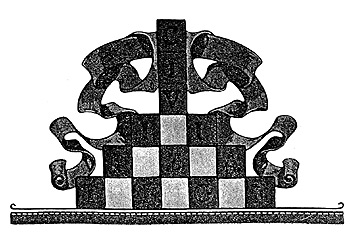
"But the invention of the telephone has helped the tobacco-shop man. He has a telephone in his shop, and there is one in the shop of his wholesaler. He can telephone his wholesaler any time, when he needs a couple of pounds of tobacco. So he does just that. And the invention of the automobile made it easy for the wholesaler to hustle around a light car and deliver a few pounds of tobacco. So the man, the telephone and the automobile helped the dealer in tobacco. He can get his supplies quickly. And what happens? If he used to buy enough at one time to last a month, he now buys enough to last a week, or a couple of days. He does business on a small margin. Of stock on hand, I mean. And for that reason he can carry more brands, can't he? He can carry a couple of pounds of forty brands instead of forty pounds of a couple of brands -- for the same money. That's civilization, in one way. Instead of having two brands and saying, 'Take it or leave it!' he now says, 'No matter what your taste in tobacco may be, I've something to suit it!' That's getting civilization refined. "All right, I'm coming to my 'Save Your Neck' idea; give me time. Don't be in such a hurry.
"Now let me ask you if you believe there was any man in America smart enough to say, when he heard someone had invented a telephone, 'This means a new era in business; this means a new sort of business entirely; this means each manufacturer doing up his goods in a fancy package, with his own brand, and with that brand advertised all over the nation on billboards, in magazines, in newspapers and everywhere!' Do you believe any man was wise enough to sit down and think that out when he heard something called a telephone had been invented ? Don't you believe it!
"What happened was like this: Everybody in the manufacturing business had wanted, for a long time, to sell under his own brand. If he could advertise his own brand and get people asking for it he would have his trade hitched to his own car -- nailed to his own mast. The thing had already begun -- soaps, tobaccos, cigars, a lot of things. But not sugar; not salt; not a lot of other things.
"I'm coming to saving civilization with a clean collar; just be patient. I've thought it all out, I tell you!
"So along comes the telephone -- another step forward in civilization -- and everyone has to have one. Telephone in every house; telephone in every store. And presently the grocer notices something. People are not buying twenty-five pounds of sugar as they used to. People are not buying flour by the barrel as they used to. People are not buying bacon by the 'side' as they used to. The lady of the house does not have her 'marketing day' -- her Wednesday or Thursday or Saturday -- when she comes to the store and orders stuff for a week or for two weeks. She don't walk, or drive, downtown once a week and say 'I want twenty-five pounds of sugar, and a ten-pound jar of butter, and five bushels of potatoes,' and so on. She picks up the telephone two or three times a day and says, 'Please send me on the next delivery a pound of sugar and a half a peck of potatoes and a pound of butter. And, oh, yes! have you any of that pimento cheese that comes in tiny little jars? Then send me one.' Or she says, 'Send me a pound jar of bacon, and one can of corn, and send it right away, because I want it for lunch and it is already half past eleven and the children will be home from school at noon.'
"And, mind you, if the grocer don't get that order to the house mighty suddenly the children are liable to find nothing for lunch. And that's one thing the telephone did. It took the big store of food supplies out of our kitchen cupboards and put them on the shelves of -- not the retailer -- but the wholesaler. Now you begin to get what I mean, I guess. The manufacturer began putting his goods in smaller and smaller parcels. Thirty-five years ago sugar came in 325-pound barrels; now it comes in one-pound cartons. When a housewife has a pound carton of sugar on her shelf, with half the sugar used out of it, she has 'sugar in the house.' When she takes a can of corn from the grocer's delivery boy and reaches for the can-opener with the other hand, she has 'food for the family.' And, of course, all these small parcels of food bear the makers' or packers' trademarks -- and that is all right. That's perfectly good business. What I'm telling you is that when civilization progressed by the invention of the automobile and the telephone it then and there stepped just that far away from the days when we thought we had to keep a good big stock of food in the house. We can get it quickly so we do not need much on hand. We can get standardized brands so we need not go to the store and look at the rice and examine the sugar. We go to the telephone and say, 'One pound of this sugar and one pound of that rice,' and in a few minutes the automobile delivers it at the door.
"I'm just giving you this as an example, this grocery fact. What it means is that as civilization gets finer and more complete the crust of safety gets thinner and thinner. In the old days I might be snowbound at home for a month and we would have plenty to eat; today, if the telephone breaks down, I may have nothing but yesterday's scraps for dinner, and have nothing at all tomorrow. In a week my whole family might be starved to death. The more civilization the more danger of trouble. That's so, isn't it?
"I have a lovely china bathtub and hot and cold water all over the house. I turn a spigot and I get hot water by the gallon; I turn another spigot -- call it a faucet, then, if you want to -- and I get good, safe, cold, drinking water. But if my patent heater goes wrong I have no hot water. If the gas is shut off or the gas factory burns down or blows up, I have no hot water and no gas to cook with. Civilization's narrow margin, do you see? In the old days I used to have a pump in the kitchen sink; it was work to pull away at that pump handle but we had water any time we wanted it. If the city water works goes out of commission today I don't know what I can do for water to drink; there is no water. There is no water fit to drink within ten miles of me. Civilization's narrow margin, you see.
"And the same thing is everywhere. Every new invention makes us more dependent on a machine or a method. Every new invention makes a few more of us more helpless in case that machine or method goes bad. The man who did not walk to his office used to be a rare bird; if a car line goes out of order today whole hundreds of men never get to business at all. And that's modern civilization -- fine and dandy as long as it keeps going, but with some mighty thin spots. I might call it a tower of cards -- each year as new machines and methods are invented, a few more sections are built on top and we climb up onto them. And the higher and nobler the tower the easier to upset it.
"All right! All right! I'm coming to the clean collar in a minute.
"How long would it take, I want to ask you first, to make of this wonderful America of ours a barbarous desert? We've been about three hundred years making this American civilization. We've kept in touch with Europe, and that has helped. Well, listen; on a shutter on my house there was an English sparrow's nest -- straw and grass and some rags. It was a lively and complete home for the sparrows. Along came that big blow and rain last week and -- no nest! It took just ten minutes for that storm to rip that sparrow-civilized colony into loose straw and waste grass. Nothing left.
"A bird will build a nest in a tree -- a beautiful nest -- and line it with down, lay her eggs, raise her young. The next season that nest is nothing but a tangle of waste, all askew on a limb. The next year it is wet mush in the grass. The next year it isn't anything.
"A couple of years ago I rented my house to a fellow. I had a fine backyard, close-cut grass and a huge oak tree eight hundred years old. When I came back the oak tree was all over the place, a windstorm wreck, and the weeds in the yard were shoulder high. I've been working at them three years and they are not all gone yet. The whole backyard was like death and desolation, and those renters, who had rented the place so their little son could play around on it, had forbidden him to go into the backyard because of the snakes!
"Move out of a good house and leave it alone and in a few years it is a wreck; a few more years and it is a rotted pile of wood. That's how rapidly civilization crumbles.
"If you keep a board painted it will stand the weather for years; save the paint and leave the board out in the weather and in three years it is red mulch and nothing else. That's how civilizations fade away; iron rusts, wood decays, culture vanishes, decency turns rotten and becomes a stench. To keep civilization safe every man must do the thing he is expected to do, and do it regularly.
"The other day they had a little trouble over in Russia. That country never has been civilized, as we call civilization. It has just been about one-third civilized. None of the complicated-machinery civilization we have over here ever got a good grip on Russia. The Russian tower of cards was not very tall. The telephone was a joke and the automobile a sort of myth over there. The railroads were a little better than camels, but not as numerous. The best you could say was that not all Russia was barbarous, and that some of it was almost civilized. Then came this Bolshevist mania and what civilization there was got an awful jolt.
"If that jolt had happened to America it would not have been a case of a few millions starving -- everyone would have starved. Two or three cards would not have settled to a slightly lower level -- the whole structure would have fallen ker-plunk over night. Everything would have crashed. For a few months, perhaps, we would all have been animals -- then we would have died. We would have rotted where we lay and any of us who would have remained alive would have moved on to get out of the odor. It would take, as I figure it, about two months to knock our American civilization into a cocked hat if what happened in Russia happened over here. That's because our civilization is so much more complex and delicately adjusted and super-refined. It is easier to ruin a watch than a crowbar.
A crude civilization is like a horse; it is a wild animal trained to pull a plow. A higher civilization is like a tractor. If trouble comes the horse can eat the grass at its feet, and a country veterinarian with a syringe or a dose of salts can put it in some sort of working order. If you have a tractor, its food has to be pumped out of the earth, refined into gasoline, transported thousands of miles. It has to be mixed with air in a delicate man-made machine. To turn that food into power, electricity has to be created and sent over wires into perfectly made cylinders. Experts are needed to create the tractor and to repair it. If the gasoline supply fails, it is dead. That is how modern civilization is. You can cut a kidney out of a man or out of a crude civilization and they can keep going somehow; if you break a hairspring in a watch or in a high civilization they stop. They're dead.
"I suppose you fellows have read Sinclair Lewis' 'Main Street' book and his 'Babbitt' book. I have, and they are bully stories, both of them, but to my notion each has a screw loose. Or I might say that each misses the truth in one way or another. You know what 'Main Street' purports to be -- it's a picture of a small town. It is a rather glum and sordid picture of life in a small town, too. Everyone in the town is pretty well satisfied with the town and thinks its ugly Main Street is just about right -- don't know or care for anything better. Well, there's just one thing the author left out of the book, and to my mind it is the most important thing -- it is the real spirit of the small-town Main Street. It is a sort of jesting, jollying, good-neighborly, teasing, humorous American spirit. It is the 'Hello Bill, how's our J. P. Morgan this morning?' that the grocer greets the banker with. It is the sane and smiling American sense of humor and habit of good companionship. Up and down every real Main Street, the fellows keep joshing each other every day in every way; they meet at the post office and on the street and are 'Jim' and 'Bill' to each other, and they take time to tell each other funny stories, including the joke on Sam. You know how it is -- there's a good fellowship and a chumminess on the real Main Street.
And then we come to the 'Babbitt' book, which takes its little whack at the 'Boosters' Club' and the Rotary and the other clubs of that sort where you and I get together once in a while. When you get down to the meat of 'Babbitt' you find it is a knock at us -- at you and me. All right! Have it so. But I sort of kick when anybody points at us and says 'Rotary Club -- a bunch of "Babbitts."' It took an Englishman to put his finger on the truth about that 'Babbitt' book. It was Hugh Walpole, I think. He said something like, 'This "Babbitt" book is all right, but it don't strike me as being such an awful true book. I know a lot of Americans -- businessmen in and out of Rotary -- and this character Babbitt don't seem to me to be the businessman I know. This Babbitt was a crook, he was a genuine crook, putting over a crooked real-estate deal, and I haven't noticed that the American businessman is a crook.' And that's true, isn't it?
"So, if you once see that -- that Babbitt is not a typical businessman of America -- you can see that the 'Boosters' Club' is not a real picture of these American businessmen's clubs, because this Sinclair Lewis makes this crook Babbitt the typical member of the 'Boosters'. So the whole picture is out of drawing and askew and not worth bothering about. It needn't worry anybody.
"But what I wanted to say was this: There must be some mighty good reason for Rotary clubs and such clubs, or they wouldn't be so numerous and so popular and so increasingly successful.
"Did you know there are about three thousand of those clubs in the United States? And they are in England -- in France -- Spain -- China -- Japan -- South Africa -- South America -- in fact almost everywhere. And the funny thing about it is that a cross-section of the membership would show a hundred and one varieties of religious faith and of political affiliations and a couple of thousand varieties of business and professional occupations. Rather queer, isn't it? Nothing here in common at all. Well, what is the common tie that holds them together? I'll tell you. Listen to this:
"The objects of Rotary are to encourage and foster: The ideal of SERVICE at the basis of all worthy enterprise. High ethical standards in business and professions. The application of the ideal of service by every Rotarian to his personal, business and community life. The development of acquaintance as an opportunity for service. The recognition of the worthiness of all useful occupations and the dignifying by each Rotarian of his occupation as an opportunity to serve society. The advancement of understanding, good will, and international peace through a world fellowship of business and professional men united in the Rotary ideal of service."
"Simple, isn't it? Nothing perplexing about that. Plain as day. Just 'service,' and honor and honesty in business office and home, and friendship and fellowship, and understanding the other fellow's viewpoint. Of course they've got it written out in pretty nice language but it's just real good
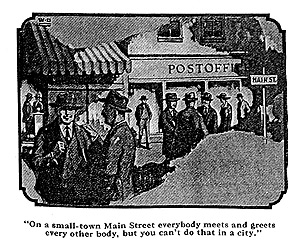 fellowship and chummy good nature -- that very spirit of good-fellowship and chummy good-nature that Sinclair Lewis left out of his 'Main Street' book. And that spirit is the true spirit of Americanism, if there is any. It is the get-together-and-be-boys spirit. If you know what I mean. And that is why we need Rotary clubs and other such clubs.
fellowship and chummy good nature -- that very spirit of good-fellowship and chummy good-nature that Sinclair Lewis left out of his 'Main Street' book. And that spirit is the true spirit of Americanism, if there is any. It is the get-together-and-be-boys spirit. If you know what I mean. And that is why we need Rotary clubs and other such clubs.
"No, I'm not forgetting the clean collar -- wait a minute.
"On a small-town Main Street everybody meets and greets every other body, but you can't do that in a city. The men don't walk down to the post office for the ten o'clock mail in Buffalo or New York. Every day every man in a city gets his nose closer to his own business and gets less in touch with the other fellows. So in comes Rotary, with a lunch table, and there you are! Jim meets Bill and I meet you and I take myself a little less seriously and think a lot more of you. We do josh and jolly each other, whether it is Buffalo or Manhattan, just about as we did when we were back there in Gopher Prairie.
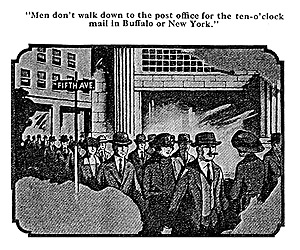
"As I look at it these clubs are worth more to America than all the lecturers that ever spouted -- and there are a thousand and one mighty fine lecturers, each with his own little story of what the trouble is, and how we are to be saved. But they don't need to preach to these clubs. Not on your life. When the bunch out there in Gopher Prairie gets together in the post office when the ten o'clock mail from the East comes in, the wild-worded communistic bunk does not have much chance. The Flossie Flora with her seasick art notions gets just about two thoughts and a joke, and is laid away among the 'don't matter much' junk. The weird and the unhealthy wither mighty quick when the bunch gets together. And that is what a Rotary club does in a city. It takes things coolly. It gives things the once-over and it isn't easily forced or led astray. There is nothing shows up the falsity of a thin-blooded belly-acher's propaganda as surely as dropping it in the midst of a bunch of good-natured Main Street or Broadway businessmen.
"Just a minute and I'll come to my 'Save Your Neck' notion. I said I would.
"You see, I had been thinking these things, like I've told you, and it struck me that when you came right down to facts these Rotary clubs of ours, and similar clubs, were in effect a sort of backbone for this card-tower civilization of ours. Whatever else you may say of these clubs and groups they have a sort of good-natured common sense. They are not hysterical and they don't stampede. They are the men who keep the food supplies moving and the railroads running and the whole machinery in order. If an earthquake or a Bolshevist band gives American civilization a joggle these are the men who have the job of keeping the whole business from tumbling down. And they can mighty near do it, because they have learned to call each other Jim and Bill and tell a joke and take one. Strangers can't work together to the best advantage; the men who already know each others' points -- good or bad -- can. And if they have learned how to smile, so much the better.
"Well, before a man leaves home in the morning, he puts on a clean collar. When he dresses he puts on that clean collar and he feels he is ready to meet any of the fellows. And if he don't put on that clean collar he is uneasy, someway, all morning. 'Pshaw ! my collar is soiled; I guess I'll cut the luncheon today.' Or, I'll try to get out of that appointment.' It struck me that the more clean collars I could get on the necks of the men of this town, the easier things would go -- more appointments would be kept -- better
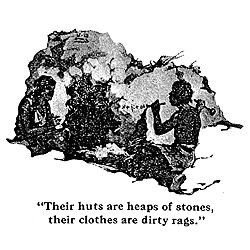 impressions would be made -- business would even be better. Then other laundry men would follow suit -- conditions all over would become better. Then, if trouble came, it would be easier to kill Bolshevism. And if we killed Bolshevism early, the Bolshevists would not have a chance to grab everything and stand us up and cut our throats. That is one of the things I mean when I print on my wrapping paper 'Patronize the Gem Laundry and Save Your Neck.'
impressions would be made -- business would even be better. Then other laundry men would follow suit -- conditions all over would become better. Then, if trouble came, it would be easier to kill Bolshevism. And if we killed Bolshevism early, the Bolshevists would not have a chance to grab everything and stand us up and cut our throats. That is one of the things I mean when I print on my wrapping paper 'Patronize the Gem Laundry and Save Your Neck.'
"But I mean another thing, too. You go down to South America and up on the Andes and somewhere you'll find some Indians living in just about the most uncivilized way. Their huts are heaps of stones, their clothes are dirty rags, their fuel is dried refuse, and their food is miserable stuff. Everything is dirty, everything is disorderly. That is barbarism. And as you climb up the scale of civilization you get more and more neatness and cleanliness and order. You come to one of these small American homes, houses neatly painted, lawn neatly cut, bath tub clean, plumbing in order, small automobile polished and with good tires.
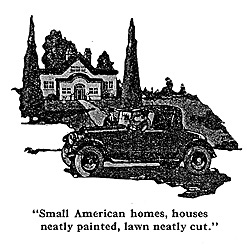
"And I told you how quickly nature and rust and weather destroy all that. Well, it struck me that the man who keeps his lawn seeded and cut is an agent of civilization. The day he neglects his lawn and lets the weeds come in and the grass grow wild he is letting barbarism slip in on him and on his community. His next-door neighbors don't feel as much necessity for keeping their places neat and tidy. The town gets careless. The houses go for years without paint. The automobiles get rusty and rackety. The roads go to pieces. Civilization begins to go backward. Presently the whole place looks like a "hill-billy" settlement. Then it looks like an Andes savages' village. So it struck me that the man who keeps his lawn cut and neat and tidy, is helping civilization quite a lot. Every brushful of paint is an agent of civilization.
"But I'm not in the paint business, I'm in the laundry business. And, thinking it over, it struck me that my best job would be to put as many clean collars on the necks of the men of this town as I could. Because -- and I leave it to you if it is not so -- the clean collar is the first step away from Bolshevism and barbarism. Am I right?"